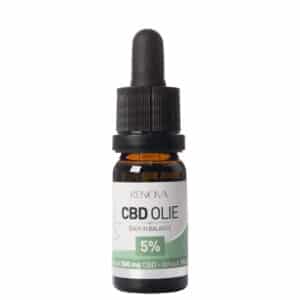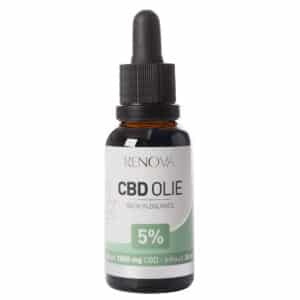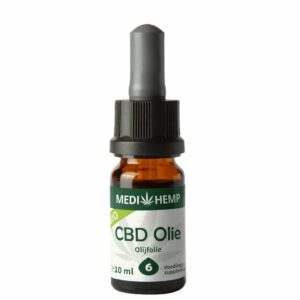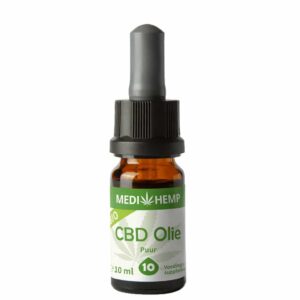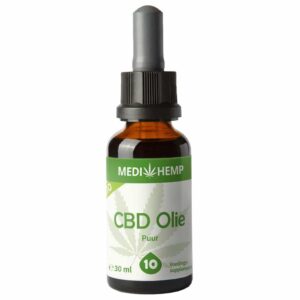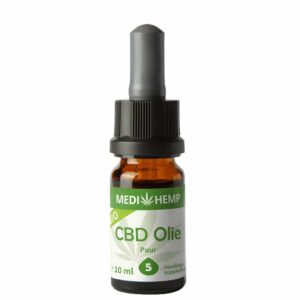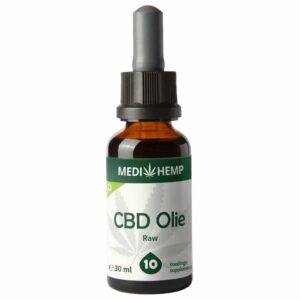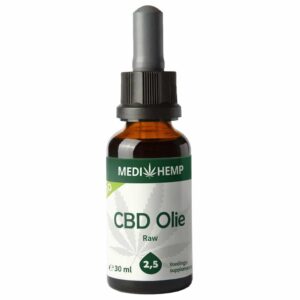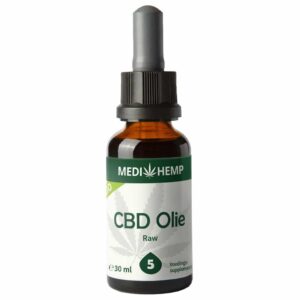Merken
Categories
Price
Percentage CBD
Brand
Inhoud
Category: CBD Oil
Discover our premium CBD oils, derived from organically grown hemp plants. Choose from full-spectrum CBD oil, containing all the natural compounds found in hemp, broad-spectrum CBD oil, offering the benefits of multiple cannabinoids without THC, or CBD isolate, the purest form of CBD.
Our high-quality CBD oils are third-party lab tested for potency, purity, and safety. Explore the potential benefits of CBD oil for managing pain, anxiety, sleep, and more. Our THC-free CBD oils support your well-being through sublingual, oral, or topical application, helping you unlock nature’s potential.
Showing 17–32 of 32 results
What is CBD Oil?
CBD, or cannabidiol (CBD), is a natural compound extracted from hemp plants, specifically the cannabis sativa plant. Unlike THC, another well-known cannabinoid, CBD is non-psychoactive, meaning it doesn’t produce the “high” associated with cannabis use. CBD oil is made by extracting CBD from the hemp plant and diluting it with a carrier oil, such as hemp seed oil or coconut oil.
CBD interacts with the body’s endocannabinoid system, which plays a crucial role in regulating various physiological processes, including pain, inflammation, mood, and sleep. This interaction has led to extensive research into the potential health benefits of CBD, particularly in the management of conditions like chronic pain, anxiety, and epilepsy. As a result, CBD oil has gained significant popularity as a natural alternative to prescription medications, with the global CBD market expected to continue its rapid growth in the coming years.
What are the different types of CBD Oil?
CBD oil comes in three main types: full-spectrum, broad-spectrum, and CBD isolate. Full-spectrum CBD contains all the natural compounds found in the hemp plant, including trace amounts of THC (less than 0.3%), terpenes, and other cannabinoids. This combination creates the “entourage effect,” which is believed to enhance the overall therapeutic benefits of CBD.
Broad-spectrum CBD is similar to full-spectrum but undergoes additional processing to remove THC while retaining other beneficial cannabinoids and terpenes. This option is ideal for those seeking the potential advantages of the entourage effect without any exposure to THC.
CBD isolate is the purest form of CBD, consisting of 99% pure cannabidiol without any other hemp-derived compounds. This type is perfect for individuals who prefer to avoid THC entirely or who require high doses of CBD for their specific health issues.
How does CBD Oil work in the human body?
CBD interacts with the body’s endocannabinoid system (ECS), a complex network of receptors and neurotransmitters that helps regulate various physiological processes, including pain sensation, inflammation, mood, sleep, and appetite. The ECS consists of two main types of receptors, CB1 and CB2, which are found throughout the body, including in the brain, immune system, and peripheral nervous system.
When CBD enters the body, it indirectly influences the activity of these receptors, modulating the release of neurotransmitters and other signaling molecules. This interaction helps to restore balance within the ECS, which can become dysregulated due to factors like stress, poor diet, and illness.
One of the key ways CBD exerts its effects is by inhibiting the breakdown of anandamide, a naturally occurring endocannabinoid that plays a crucial role in pain management and emotional regulation. By increasing anandamide levels, CBD may help to reduce pain, inflammation, and anxiety, among other potential benefits.
What are the therapeutic effects of CBD Oil?
Numerous scientific studies have investigated the potential health benefits of CBD oil, with promising results in various areas. One of the most well-established benefits is pain relief, particularly for chronic pain conditions such as arthritis, multiple sclerosis, and neuropathic pain. CBD has been shown to reduce inflammation and modulate pain signaling pathways, offering an alternative to traditional pain medications.
CBD may also have anxiolytic (anti-anxiety) and antidepressant properties, with several clinical trials demonstrating its effectiveness in reducing symptoms of anxiety disorders, including generalized anxiety disorder, social anxiety disorder, and post-traumatic stress disorder (PTSD). Additionally, CBD has shown potential as a treatment for sleep disorders, such as insomnia, by promoting relaxation and improving sleep quality.
Other potential benefits of CBD oil include reducing seizure frequency in epilepsy patients, lowering blood pressure, and providing neuroprotective effects in neurodegenerative disorders like Alzheimer’s and Parkinson’s disease. While more research is needed to fully understand the mechanisms behind these benefits, the existing evidence suggests that CBD oil may offer a safe and effective option for managing a wide range of health conditions. It’s important to be aware of the potential adverse effects of CBD oil, such as diarrhea, changes in appetite, weight, fatigue, abnormal liver function, drowsiness, sedation, and pneumonia, as well as its interactions with other medications. Consulting with healthcare professionals about dosing and the risk of side effects is crucial for safe use.
How should CBD Oil be dosed and administered?
When starting with CBD oil, it’s essential to begin with a low dose and gradually increase it based on your individual response and tolerability. A common starting dose is 5-10mg of CBD per day, which can be adjusted upward in 5mg increments until the desired effects are achieved.
Factors that influence the optimal dosage include body weight, metabolism, and the severity of the condition being treated. As a general rule, individuals with higher body weight or more severe symptoms may require higher doses to experience the same benefits as those with lower body weight or milder symptoms.
It’s crucial to consult with a healthcare provider before starting any CBD regimen, especially if you are taking prescription medications or have underlying health conditions. CBD can interact with certain medications, such as blood thinners and antibiotics, so it’s important to monitor for potential side effects and adjust the dosage accordingly.
When using CBD oil, it’s recommended to start with a single daily dose, preferably in the evening, to assess your tolerance and any potential side effects. As you become more comfortable with the effects of CBD, you can gradually increase the frequency and amount of your doses, spreading them throughout the day for consistent benefits. Understanding the ‘cbd legal’ status is vital, as the legality of CBD varies between hemp-derived products with less than 0.3% THC, which are federally legal but may still be illegal in some states, and cannabis-derived CBD, which is illegal federally but may be legal in certain states. This complexity underscores the importance of adhering to local laws when considering dosage and administration practices.

What Are the Side Effects and Interactions of CBD?
Medical cannabis, which includes CBD oil derived from the leaves, stems, buds, and flowers of the Cannabis indica or Cannabis sativa plant, encompasses a range of products with potential therapeutic benefits and risks. While CBD is generally considered safe and well-tolerated, some individuals may experience side effects, particularly when using high doses or in combination with certain medications. The most common side effects of CBD include fatigue, diarrhea, changes in appetite, and weight fluctuations.
In rare cases, CBD may cause liver toxicity, especially when taken in high doses or with other medications that are metabolized by the liver. Symptoms of liver toxicity include abdominal pain, nausea, vomiting, and yellowing of the skin and eyes. If you experience any of these symptoms while using CBD, discontinue use immediately and consult with a healthcare provider.
CBD can also interact with several prescription medications, including antibiotics, antidepressants, and blood thinners. These interactions can alter the effectiveness of the medications or increase the risk of side effects. It’s essential to inform your healthcare provider about any CBD use and closely monitor for potential drug interactions.
Pregnant and breastfeeding women should avoid using CBD due to the lack of safety data in these populations. Additionally, individuals with a history of substance abuse or mental health disorders should use CBD with caution, as it may exacerbate certain symptoms or interact with existing treatments.
To ensure the safety and quality of CBD products, always purchase from reputable brands that provide third-party lab testing results and adhere to strict manufacturing standards. Consult with a knowledgeable healthcare professional to determine if CBD is appropriate for your individual needs and to establish a safe and effective dosage plan.
What Are the Methods of Consuming CBD Oil?
There are three main methods for consuming CBD oil: sublingual, ingestion, and topical application. Each method has its own advantages and considerations, allowing users to choose the most suitable option for their needs and preferences.
- Sublingual: This method involves placing a few drops of CBD oil under the tongue and holding it there for 30-60 seconds before swallowing. The CBD is absorbed directly into the bloodstream through the mucous membranes, bypassing the digestive system and providing faster relief. Sublingual administration is ideal for those seeking quick effects or for managing acute symptoms like pain or anxiety.
- Ingestion: CBD oil can be added to food or beverages, such as smoothies, coffee, or baked goods. When ingested, CBD passes through the digestive system and is metabolized by the liver before entering the bloodstream. This method provides longer-lasting effects but has a slower onset compared to sublingual administration. Ingestion is suitable for those seeking sustained relief throughout the day or for managing chronic conditions.
- Topical: CBD oil can be applied directly to the skin in the form of creams, lotions, or balms. Topical application is ideal for targeting localized pain, inflammation, or skin conditions. The CBD interacts with local cannabinoid receptors in the skin, providing relief without entering the bloodstream. This method is perfect for those seeking targeted benefits without the systemic effects of oral or sublingual consumption.
To maximize the effectiveness of each intake method, it’s essential to follow proper dosing guidelines and to use high-quality, lab-tested CBD products. Experiment with different methods and dosages to find the most effective approach for your individual needs, and always consult with a healthcare professional before starting any new CBD regimen.
How Can the Quality and Safety of CBD Products Be Ensured?
When selecting CBD oil products, it’s crucial to choose high-quality options to ensure safety, effectiveness, and value for money. Here are some key factors to consider when evaluating CBD products:
- Third-party lab testing: Reputable CBD brands should provide independent lab test results, also known as Certificates of Analysis (COAs), for each batch of their products. These tests verify the potency, purity, and safety of the CBD oil, ensuring that it is free from contaminants like heavy metals, pesticides, and residual solvents.
- Hemp source: Look for brands that use organically grown, non-GMO hemp plants from reputable farms. Hemp is a bioaccumulator, meaning it absorbs compounds from the soil, so it’s essential to choose CBD derived from plants grown in clean, nutrient-rich soil without the use of harmful chemicals.
- Extraction method: CO2 extraction is considered the gold standard for producing high-quality CBD oil. This method uses pressurized carbon dioxide to extract CBD and other beneficial compounds from the hemp plant, resulting in a pure, potent, and safe product. Avoid brands that use harsh solvents like butane or propane, as these can leave harmful residues in the final product.
- Transparency: Trustworthy CBD brands should be transparent about their manufacturing processes, ingredient sources, and lab testing results. They should provide clear, detailed information about their products and be responsive to customer inquiries and concerns.
- Brand reputation: Research the brand’s reputation by reading customer reviews, checking for any FDA warning letters, and investigating their industry partnerships and certifications. Look for brands with a track record of producing high-quality, effective products and providing excellent customer service.
- Dietary supplements: Given that CBD is an approved prescription drug and cannot be legally included in foods or dietary supplements without specific approval, it’s vital to exercise caution with CBD products marketed as dietary supplements. Ensure they meet quality and safety standards, as their availability in various forms, including online and in stores, necessitates careful consideration of their legitimacy and compliance with regulations.
What Is the Legal and Regulatory Framework for CBD Oil?
The legal landscape surrounding CBD is constantly evolving, with regulations varying by country and even by state within the United States. In the U.S., the 2018 Farm Bill legalized hemp-derived CBD oils and other CBD products containing less than 0.3% THC at the federal level. However, individual states may have their own laws and restrictions regarding the sale, possession, and use of CBD.
The market offers a wide array of CBD product forms, including tinctures, capsules, topicals, and edibles, each with its own legal nuances in terms of sale and distribution. This diversity underscores the importance of understanding the specific legal framework that applies to CBD products in your area.
In the European Union, CBD is legal as long as it is derived from hemp plants with less than 0.2% THC. However, each member state has the authority to set its own laws and regulations regarding CBD products, so it’s essential to research the specific requirements in your country.
In the United Kingdom, CBD products are legal and regulated as food supplements. Manufacturers must obtain a novel food authorization from the Food Standards Agency (FSA) to sell CBD products, ensuring they meet strict safety and quality standards.
Canada has federally legalized both hemp-derived and cannabis-derived CBD products, but with different regulations. Hemp-derived CBD products are regulated as natural health products, while cannabis-derived CBD is regulated under the Cannabis Act and requires a prescription from a licensed healthcare provider.
Australia and New Zealand have recently made changes to their CBD regulations, allowing for the sale of low-dose CBD products over the counter in pharmacies, subject to strict quality and safety requirements.
It’s crucial for CBD users to stay informed about the current laws and regulations in their region, as these can impact the availability, accessibility, and quality of CBD products. Always purchase CBD from reputable sources that adhere to local laws and provide clear, accurate information about their products.
As research into the potential benefits and risks of CBD continues, it’s likely that regulations will continue to evolve to ensure the safe and effective use of this promising compound. Staying up-to-date with the latest developments in CBD regulations will help you make informed decisions about incorporating CBD into your wellness routine.
Customer Service
Payment options




Information
Address
Laan ten Roode 2
5711 GC Someren
the Netherlands





 Excellent rating on
Excellent rating on 